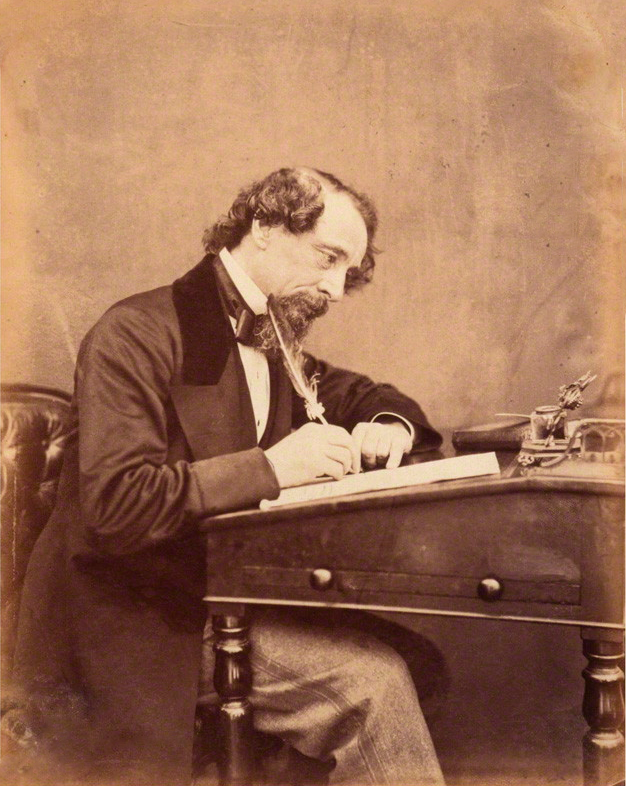Republished by Blog Post Promoter
 This is my recent review of the audio book David Copperfield, written by Charles Dickens and performed by Mr. Simon Vance:
This is my recent review of the audio book David Copperfield, written by Charles Dickens and performed by Mr. Simon Vance:
“Charles Dickens defines the English language in application to the environs and inhabitants of his contemporary life with perfect eloquence and poignant emotion. David Copperfield, the novel, describes and embodies England and the English language at the pinnacle of its cultural power in the mid 1800s.
The narrative performance of this audio book by Mr. Simon Vance, of the myriad characterizations of persons and scenarios described or diverse diatribes of conversation conducted therein, cannot have been exceeded by the most eloquent thespian on any Shakespearean stage! Bravo, Bravo, Bravo Sir!
If you consider yourself a proponent of the English language this audio book is essential to sustaining your use of it and of expanding your appreciation of it mastery.
The delimitation of “rating” this book to “5 Stars” is a desecration of the monument and memory of Charles Dickens which shines eternally in The Heavens of Literature.”
You can download a copy of this book FREE HERE:
https://www.audible.com/pd/Classics/David-Copperfield-Audiobook/B002V8LEW2
from Wikipedia:
Charles John Huffam Dickens (7 February 1812 – 9 June 1870) was an English writer and social critic. He created some of the world’s best-known fictional characters and is regarded by many as the greatest novelist of the Victorian era.[1] His works enjoyed unprecedented popularity during his lifetime, and by the 20th century critics and scholars had recognised him as a literary genius. His novels and short stories enjoy lasting popularity.[2][3]
Born in Portsmouth, Dickens left school to work in a factory when his father was incarcerated in a debtors’ prison. Despite his lack of formal education, he edited a weekly journal for 20 years, wrote 15 novels, five novellas, hundreds of short stories and non-fiction articles, lectured and performed extensively, was an indefatigable letter writer, and campaigned vigorously for children’s rights, education, and other social reforms.
Dickens’s literary success began with the 1836 serial publication of The Pickwick Papers. Within a few years he had become an international literary celebrity, famous for his humour, satire, and keen observation of character and society. His novels, most published in monthly or weekly instalments, pioneered the serial publication of narrative fiction, which became the dominant Victorian mode for novel publication.[4][5] The instalment format allowed Dickens to evaluate his audience’s reaction, and he often modified his plot and character development based on such feedback.[5] For example, when his wife’s chiropodist expressed distress at the way Miss Mowcher in David Copperfield seemed to reflect her disabilities, Dickens improved the character with positive features.[6] His plots were carefully constructed, and he often wove elements from topical events into his narratives.[7] Masses of the illiterate poor chipped in ha’pennies to have each new monthly episode read to them, opening up and inspiring a new class of readers.[8]
Dickens was regarded as the literary colossus of his age.[9] His 1843 novella, A Christmas Carol, remains popular and continues to inspire adaptations in every artistic genre. Oliver Twist and Great Expectations are also frequently adapted, and, like many of his novels, evoke images of early Victorian London. His 1859 novel, A Tale of Two Cities, set in London and Paris, is his best-known work of historical fiction. Dickens has been praised by fellow writers—from Leo Tolstoy to George Orwell and G. K. Chesterton—for his realism, comedy, prose style, unique characterisations, and social criticism. On the other hand, Oscar Wilde, Henry James, and Virginia Woolf complained of a lack of psychological depth, loose writing, and a vein of saccharine sentimentalism. The term Dickensian is used to describe something that is reminiscent of Dickens and his writings, such as poor social conditions or comically repulsive characters.[10]
